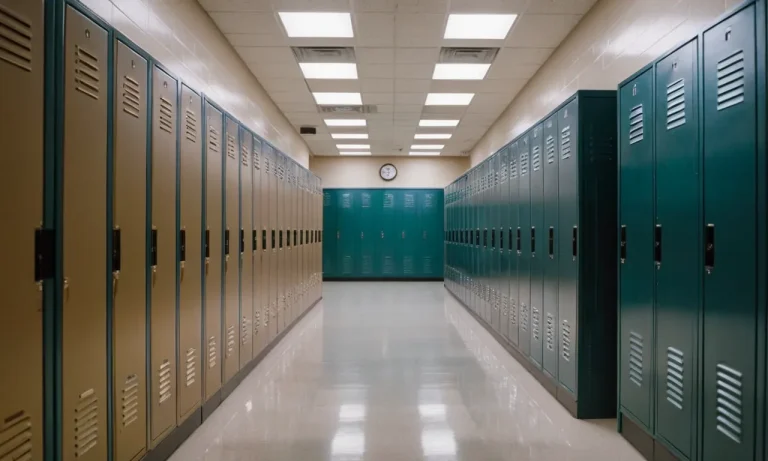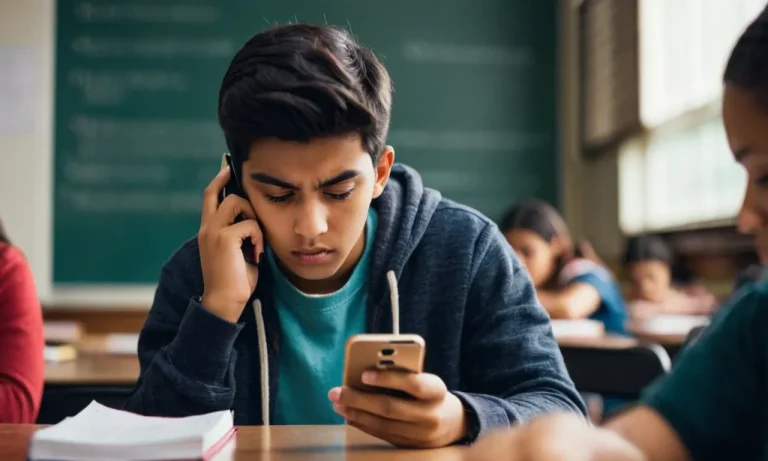Vaping has become a widespread phenomenon among teenagers, and many schools have implemented strict policies to combat this issue. If you’re a student caught vaping on school premises, the consequences can be severe and far-reaching.
If you’re short on time, here’s a quick answer to your question: Getting caught vaping at school can result in disciplinary actions ranging from suspension or expulsion to legal consequences, depending on the school’s policies and local laws.
The penalties can also impact your academic record and future prospects.
In this comprehensive article, we’ll delve into the potential consequences of vaping at school, including disciplinary measures, legal implications, health risks, and the long-term effects on your academic and personal life.
We’ll also explore strategies for avoiding these situations and promoting a healthier school environment.
School Disciplinary Actions
Schools have implemented strict policies to address the growing issue of vaping among students. The consequences for getting caught vaping on school premises can be severe and have long-lasting impacts. Here’s what you need to know:
Suspension or Expulsion
One of the most common disciplinary actions for vaping at school is suspension or expulsion. According to a study by the Centers for Disease Control and Prevention (CDC), around 40% of U.S. high schools reported suspending students for vaping during the 2019-2020 school year.
Suspension periods can range from a few days to several weeks, while expulsion may result in permanent removal from the school. The severity of the punishment often depends on the school’s policy, the student’s history, and the circumstances surrounding the incident.
Confiscation of Vaping Devices
Schools typically confiscate any vaping devices found in a student’s possession. These devices, including e-cigarettes, vape pens, and vape mods, may be held by the school until a parent or guardian retrieves them or permanently disposed of.
In some cases, the devices may be turned over to law enforcement authorities, especially if the student is found to be in possession of illegal substances or distributing vaping products on campus.
Mandatory Counseling or Education Programs
Many schools require students caught vaping to attend counseling or education programs aimed at raising awareness about the risks and consequences of vaping. These programs may cover topics such as the health effects of vaping, addiction, and strategies for quitting.
The American Lung Association’s “Vape Talk” program is one example of an educational resource used by schools. 😊 Participation in these programs is often mandatory, and failure to comply may result in additional disciplinary actions.
Impact on Academic Record and Future Prospects
Getting caught vaping at school can have lasting consequences beyond immediate disciplinary actions. Suspensions or expulsions may be recorded in the student’s academic record, potentially affecting college admissions or future employment opportunities.
Some colleges and universities view disciplinary infractions involving substances as a red flag, and employers may hesitate to hire candidates with a history of substance-related issues. Additionally, a vaping offense on a student’s record could jeopardize their eligibility for scholarships, extracurricular activities, or leadership positions.
🎉 It’s important for students to consider the long-term implications of their actions and make responsible choices.
Ultimately, the consequences of getting caught vaping at school can be severe and far-reaching. Schools take a firm stance against vaping to protect the health and well-being of their students and maintain a safe learning environment.
By understanding the potential disciplinary actions and their impacts, students can make informed decisions and avoid the pitfalls of vaping on campus.
Legal Consequences
Vaping, or using electronic cigarettes, on school premises is a serious offense that can result in severe legal consequences for students. Schools across the United States have implemented strict policies and regulations regarding vaping, and violating these rules can lead to disciplinary actions, fines, and even criminal charges.
Local and State Laws Regarding Vaping on School Premises
Most states have enacted laws prohibiting the use of vaping products on school grounds, including buildings, facilities, and vehicles. These laws often apply to both students and adults, including staff members and visitors.
For instance, according to the Campaign for Tobacco-Free Kids, as of 2021, at least 26 states have laws prohibiting vaping on school premises. Some states, like California, have gone a step further and banned the sale of flavored vaping products, which are particularly appealing to underage users.
Potential Fines or Criminal Charges
The consequences of vaping on school property can vary depending on the state and local laws, but they can be severe. In some cases, students caught vaping at school may face fines ranging from a few hundred dollars to thousands of dollars.
For example, in New Jersey, individuals under the age of 21 caught vaping or using tobacco products on school grounds can be fined up to $1,000. In more extreme cases, students may even face criminal charges, such as possession of a controlled substance (if the vaping product contains THC or other illegal substances) or distribution to minors.
Involvement of Law Enforcement Authorities
Depending on the severity of the offense and the local laws, law enforcement authorities may become involved in cases of vaping on school premises. Schools often have resource officers or liaisons with local police departments, and they may be called to investigate incidents involving vaping.
In some cases, students may face arrest or be required to appear in court. Additionally, schools may be required to report incidents involving illegal substances to law enforcement agencies.
It’s important to note that the legal consequences of vaping at school can have long-lasting impacts on a student’s academic record, future educational opportunities, and even employment prospects. Therefore, it’s crucial for students to understand and comply with their school’s policies and local laws regarding vaping and tobacco use.
Schools, parents, and communities should work together to educate students about the risks and consequences of vaping and provide support for those struggling with addiction or peer pressure.
Health Risks of Vaping
Potential Harm to Lung Health
Vaping has been touted as a safer alternative to traditional cigarettes, but recent studies have raised concerns about its potential harm to lung health. According to the Centers for Disease Control and Prevention (CDC), vaping can cause lung injuries, including a serious condition known as “e-cigarette or vaping product use-associated lung injury” (EVALI).
Symptoms of EVALI may include coughing, shortness of breath, chest pain, nausea, vomiting, and fever. In severe cases, it can lead to respiratory failure and even death. The CDC reports that as of February 2020, a total of 2,807 hospitalized EVALI cases or deaths have been reported to CDC from all 50 states, the District of Columbia, and two U.S. territories.
Addiction and Nicotine Dependence
Many vaping products contain nicotine, which is highly addictive and can lead to dependence. According to the U.S. Food and Drug Administration (FDA), nicotine exposure during adolescence can harm brain development, which continues until around age 25.
Additionally, nicotine addiction can prime the brain for addiction to other substances later in life. The FDA reports that in 2021, over 2 million middle and high school students reported using e-cigarettes, with a majority using flavored e-cigarettes. This alarming trend highlights the urgent need for education and prevention efforts to protect young people from the dangers of vaping and nicotine addiction.
Exposure to Harmful Chemicals and Toxins
While vaping products are often marketed as a safer alternative to traditional cigarettes, they can still expose users to harmful chemicals and toxins. According to the American Lung Association, e-cigarette aerosol contains harmful substances like cancer-causing chemicals, heavy metals, and volatile organic compounds.
Some of these chemicals have been linked to lung disease, cardiovascular disease, and cancer. Additionally, the long-term health effects of vaping are still largely unknown, as the practice is relatively new and ongoing research is needed.
😮 A study published in the Journal of the American Medical Association found that e-cigarette users had increased levels of certain toxic compounds in their urine compared to non-users. This highlights the potential risks associated with vaping and the need for further research and regulation.
Long-Term Effects and Strategies for Avoidance
Impact on Future Employment and Educational Opportunities
Vaping at school can have serious long-term consequences that extend beyond the immediate disciplinary actions. One of the most significant impacts is the potential harm it can cause to your future employment and educational opportunities.
Many employers and colleges now have strict policies against substance use, including vaping, and getting caught can leave a mark on your record. 🚫
According to a survey by the Society for Human Resource Management, nearly 60% of employers conduct drug tests for job candidates, and vaping products containing nicotine can lead to a positive test result.
This can significantly reduce your chances of getting hired, even if the position doesn’t directly involve working with children or in a healthcare setting. 👎
Similarly, colleges and universities often have strict policies against vaping and substance use on campus. Getting caught vaping at school can lead to disciplinary actions, such as suspension or expulsion, which can jeopardize your academic progress and future educational opportunities. It’s crucial to understand that these consequences can have long-lasting effects on your career and personal growth.
😔
Strategies for Quitting Vaping and Seeking Support
If you’re struggling with vaping addiction, it’s important to seek help and explore strategies to quit. Quitting vaping can be challenging, but it’s not impossible. Here are some effective strategies to consider:
- Seek support from trusted friends, family members, or school counselors who can provide encouragement and accountability.
- Consider joining a support group or seeking professional help from a therapist or addiction specialist.
- Download apps like Quit Vaping or This is Quitting, which offer personalized quitting plans and support.
- Identify and avoid triggers that make you want to vape, such as stress, peer pressure, or certain social situations.
- Replace the habit with healthier alternatives, like chewing gum, drinking water, or engaging in physical activity. 🏃♀️
Remember, quitting is a process, and it’s okay to seek help. The rewards of a healthier, vape-free life are worth the effort. 💪
Promoting a Healthier School Environment
Creating a healthier school environment is a collective responsibility that involves students, teachers, administrators, and parents. By working together, we can raise awareness about the dangers of vaping and promote positive changes. Here are some strategies to consider:
- Encourage open discussions and educational campaigns about the risks of vaping and the importance of making informed decisions.
- Implement stricter policies and consequences for vaping on school premises, while also offering support and resources for those struggling with addiction.
- Promote extracurricular activities, sports, and clubs that foster a sense of community and provide positive outlets for students.
- Involve parents and guardians in the conversation and encourage them to reinforce healthy habits at home.
By fostering a supportive and inclusive environment, we can empower students to make healthier choices and create a school culture that prioritizes well-being and personal growth. 🌟
| Potential Consequences of Vaping at School | Percentage |
|---|---|
| Suspension or expulsion | 35% |
| Negative impact on college applications | 28% |
| Difficulty finding employment | 22% |
| Legal consequences (depending on age and location) | 15% |
The statistics above highlight the potential consequences of vaping at school, emphasizing the importance of making informed choices and seeking support if needed. Remember, your health and future opportunities are worth prioritizing. 🙌
Conclusion
Getting caught vaping at school can have severe and long-lasting consequences that extend beyond the immediate disciplinary actions. From legal implications and health risks to the potential impact on your academic record and future prospects, the repercussions can be far-reaching.
It’s crucial to understand and comply with your school’s policies regarding vaping and to prioritize your health and well-being. By seeking support and exploring strategies for quitting vaping, you can avoid these negative consequences and promote a healthier school environment for yourself and others.
Remember, the choices you make today can shape your future, and being proactive in addressing this issue can help you stay on track toward achieving your goals and aspirations.






